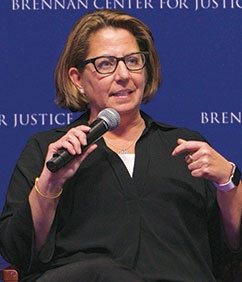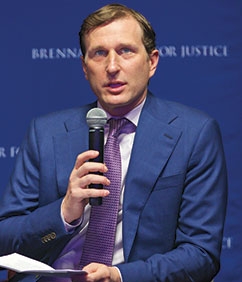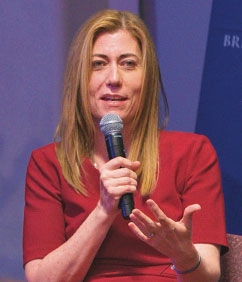Former prosecutors examine the current state and future implications of the Mueller investigation
Special Counsel Robert Mueller’s investigation into Russian interference in the 2016 election has been the source of divisive public speculation and unrest within the Trump administration. Two former prosecutors—Professor of Practice and Distinguished Scholar in Residence Anne Milgram ’96, former attorney general of New Jersey, and Distinguished Senior Fellow in Law and Security Lisa Monaco, former assistant to President Obama for homeland security and counterterrorism—discussed the investigation in an October 24 event hosted by the Brennan Center for Justice. Daniel Goldman, an NBC and MSNBC legal analyst and Brennan Center fellow, moderated the discussion.
While Mueller has kept a veil of secrecy around the investigation, Monaco said that a careful reading of the indictments reveals the groundwork for his case. “What he has been doing is—as a prosecutor should do--speaking through the court papers. He has been and his team have been laying out a very compelling story.”
Monaco cited the February 2018 indictment against 13 Russian nationals, a Russian troll farm, and two of its shell companies. “What you see when you read that indictment, is it makes reference to conduct by unnamed US persons. And I think it provides a very interesting...map for where we might see this case go,” Monaco said.
Should Mueller’s investigation lead to evidence that might implicate President Trump, the current policy of the Justice Department’s Office of Legal Counsel, which says that a sitting president cannot be indicted, would have to be overhauled. “No one has ever indicted a sitting president,” Milgram said. “It's also very clear from Mueller's appointment letter that he is required to follow existing Department of Justice policies.”
But Goldman noted that these policies can be changed. “It’s not a regulation, it's not a statute, it is simply a policy of the Department of Justice that a sitting president should notbe indicted. And, I mean, it can be reversed,” Goldman said. “[Mueller] would have to go most likely to the Deputy Attorney General and the Office of Legal Counsel and request that they reverse the policy.”
The Senate Intelligence Committee has also conducted an investigation into Russian interference, but from a prosecutorial perspective, Monaco and Milgram agreed that simultaneous investigations could raise problems. “Even a witness who's not a cooperator, who is completely truthful, may misinterpret a question and give an answer under oath that can then be used against them,” Milgram said. “And in my experience [this causes] a lot of headaches and a lot of unnecessary things.”
Once Mueller has finished his report, the Department of Justice will determine whether and what portions of its contents would be made public, Milgram said, but public demand and curiosity would eventually bring it to light. “I believe that everything leaks in America right now,” Milgram said. “And so if I were Robert Muller or Rod Rosenstein, I would never bet that this [report] will be kept a secret. Never.”
Posted December 17, 2018




